It was a beautiful day for Sunday brunch with Adriana Iwinski and her daughter, Alexa, in Santa Rosa, a small town in the mountains known for its gorgeous pottery. Elevation: 7356 feet.
Since January 2020 – before the pandemic lockdowns began – Adriana has provided me with support as a private driver offering airport shuttles, transportation in and around the Guanajuato City area, weekly grocery shopping and errand runs. If she’s already booked, her partner, Omar, is also a private driver. And when Omar is booked, his father drives me. Adriana states, “It’s a family affair.” They are very special!
As the Spanish poet, Dámaso Alonso, has stated, “Perhaps it is true: It is a heart which moves the world.”
Adriana’s daughter, Alexa, is an excellent student with a strong network of family support. Following graduation from the area Montessori School, she is in her first year of an international baccalaureate program. Her classes are taught on the public-school campus by university professors. The course load is rigorous! Alexa appears to take it in stride. How does a family keep up with the challenging schedule? Mother and daughter are both very organized!
At this point, we have covered a few miles together! And during those travels, I was able to get a peek into Adriana’s early years when she was reared by her great grandmother. She was a strong woman with an approach to life in which a quote by Albert Einstein rings true: “Look deep into nature, and then you will understand everything better.”
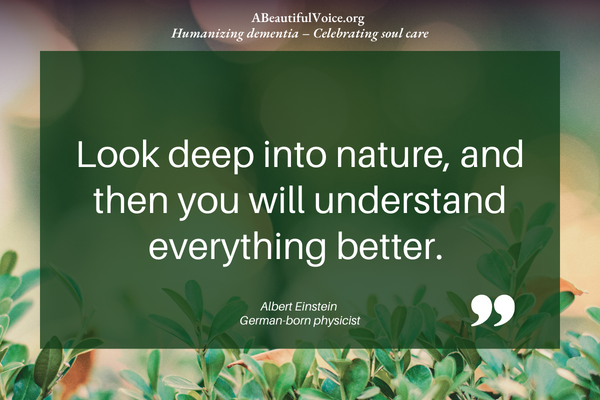
The lessons learned from her great grandmother – and shared with me in recent months – have frequently related to the healing power of nature.
Adriana is very grounded; “ready” with healing modalities which she easily discusses; doesn’t take herself too seriously and tops off her “practical tips” with an awesome sense of humor.
In many ways, we are from the same sisterhood in our outlook on life! Even while being a couple generations apart, chronologically, our viewpoints frequently resonate.
A tribute to Adriana and to her great grandmother
We had both been the primary family care partner to a loved one living with dementia. We each pursued a strong desire that dignity would prevail. Hearing about her experiences in the past, we have almost always concluded with our sharing some gentle, understanding chuckles.
Thus, this is a tribute to two exceptional “carers”:
- Adriana – for being present with her great grandmother who was diagnosed with dementia. She stepped up to provide support, relief, and respite to the family carers even while working full-time and having a young family.
- Her great grandmother – for the wisdom imparted to Adriana from childhood. It was now a full-circle gift to this remarkable matriarch, as she became the beneficiary of Adriana’s gifts bestowed during her late adulthood. She lived until age 83.
Today, Adriana continues to share the wisdom.
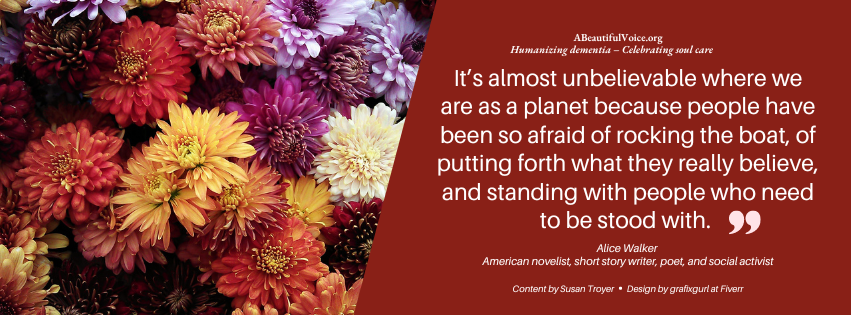
She has always appeared to take everything so easily in stride! Thus, it is only recently that I understood the depth of her feelings about serving as a care partner to her great grandmother – this experience having occurred over six years ago.
When I wondered if I had stepped over the line by asking a sensitive question, she replied firmly and decisively:
No – we need to talk about it! Working together would lead to radical changes
She was referring to society’s silent acceptance of our cultural dementia. From my conversations with past and present care partners, I have heard similar themes expressed with a familiar depth of feeling. They include not being heard and the absence of familial support during this challenging period – especially difficult at such a young age as Adriana was.
Regardless of how out-of-balance it is for the care partner, society digs in its heels to maintain the status quo – when only a slight shift could potentially provide needed relief!
Dr. Danny George and Dr. Peter Whitehouse, co-authors of American Dementia (2022), have written that change is incumbent upon all of society. In their words, we need to look at dementia through a new lens. Working together could create a radical change in dignifying our fragile older loved ones and their carers.
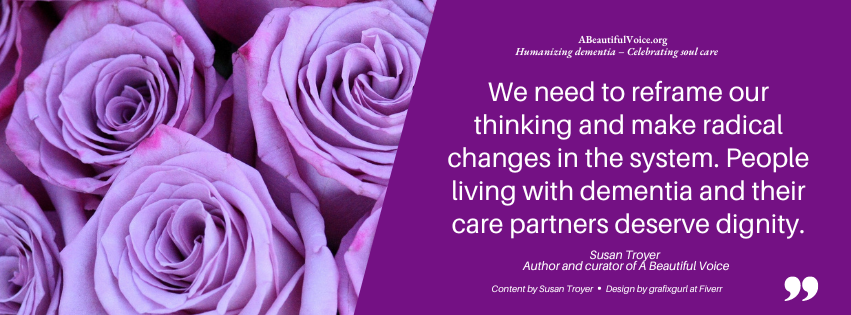
I wondered if Adriana was also articulating how her generation would be thinking and feeling in these unsettling and chaotic years as they look to the future. Having witnessed society’s lack of support and concern for their grandmothers’ care, how would they change it for upcoming generations?
But we had arrived at our destination and that conversation was cut short. In that moment, however, I saw her as my younger kindred spirit and soul sister.
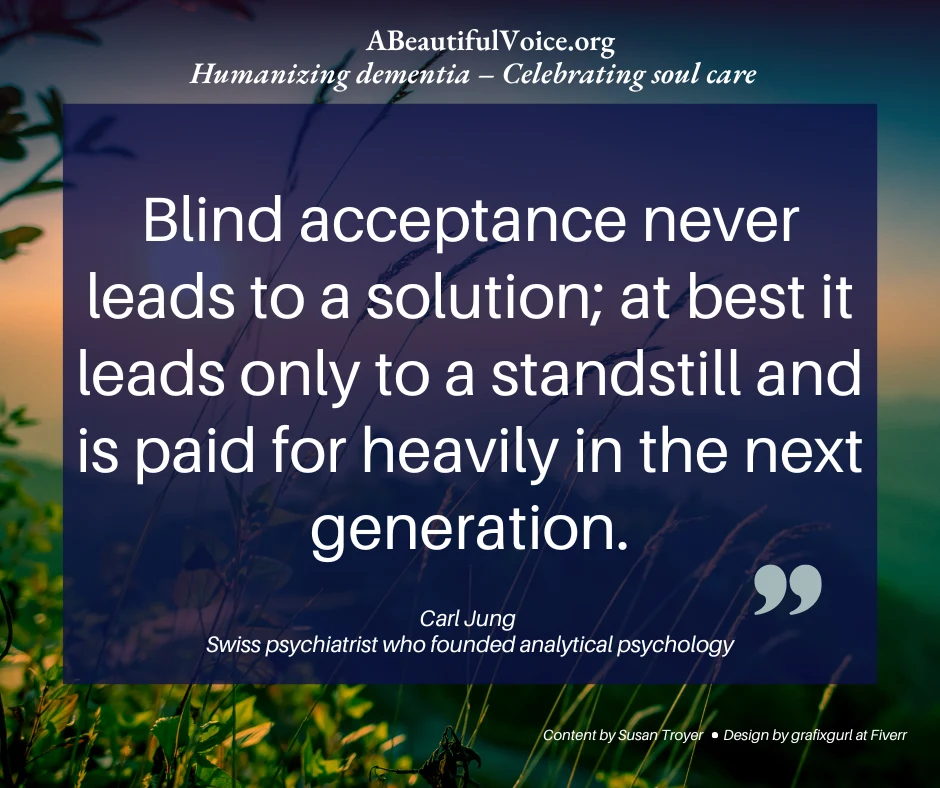
Daughters, granddaughters, and great granddaughters joining the millions of unpaid, invisible carers
Despite our generational gap, Adriana and I have both experienced similar reactions to the diagnosis of dementia. Like the multitude of caregivers who step into the shoes of the “carer” when it appears that there are no viable alternatives, we face an event for which we had not planned. And we do it because it is necessary to avoid the abandonment of our fragile older loved ones.
Like the silent and unheard legions of dementia caregivers, we would never have chosen to approach it alone. It is most definitely not a role for just one person.
And when our research indicates that developed countries are providing comprehensive health and social care systems which support caregivers of persons with dementia, why aren’t countries in the Western hemisphere addressing this women’s issue?
Perhaps because it has been just that – predominantly a women’s issue.
A question we have raised in earlier e-magazine posts is this: Millennials need only to look to the current period in our history to know what not to do. Inheriting a legacy in ruins will be an unfair and overwhelming burden for the millennials. Will it be left to this younger generation to correct these societal inequities? Will our contemporaries be known for silently living in comfort and leaving the work of fixing the inequities to Adriana’s generation of millennials?
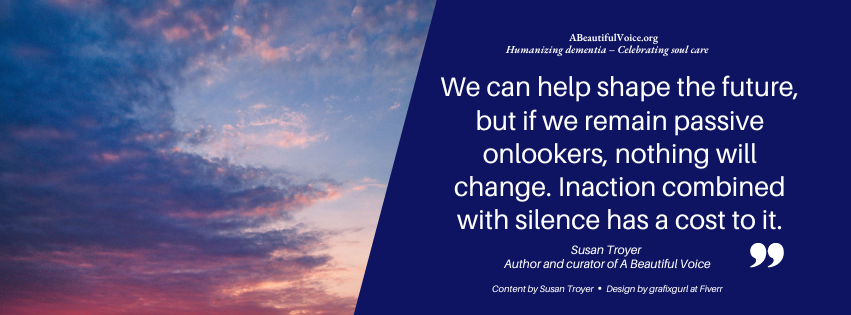
In various ways, I have discovered an intergenerational, transcultural connection with Adriana. I’m always more inspired and better prepared for each new day after being in her company. We have found solidarity based on “shared conditions, experiences, and concerns” – a dictionary definition of “sisterhood.”
She delivers – above and beyond!
As my primary driver, she knows every street in this beautiful city in the Central Highlands of Mexico. She goes above and beyond what is required. And I am among the fortunate to know her.
So this is my tribute to you, querida Adriana! Un abrazo y mucha salud!
Author: Susan Troyer, MS, BA
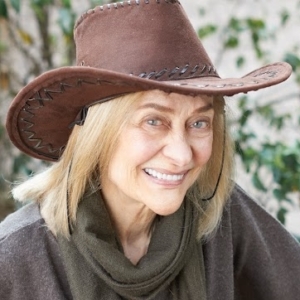

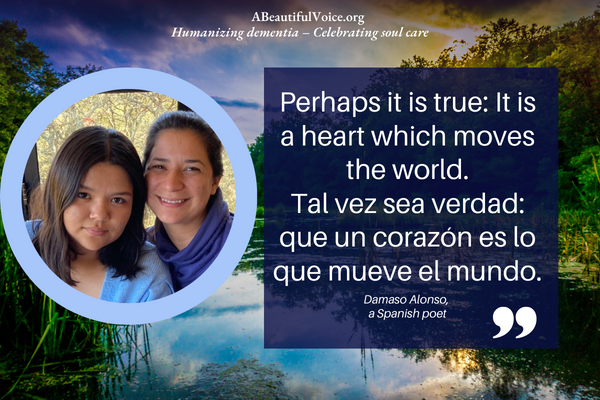
Leave A Comment